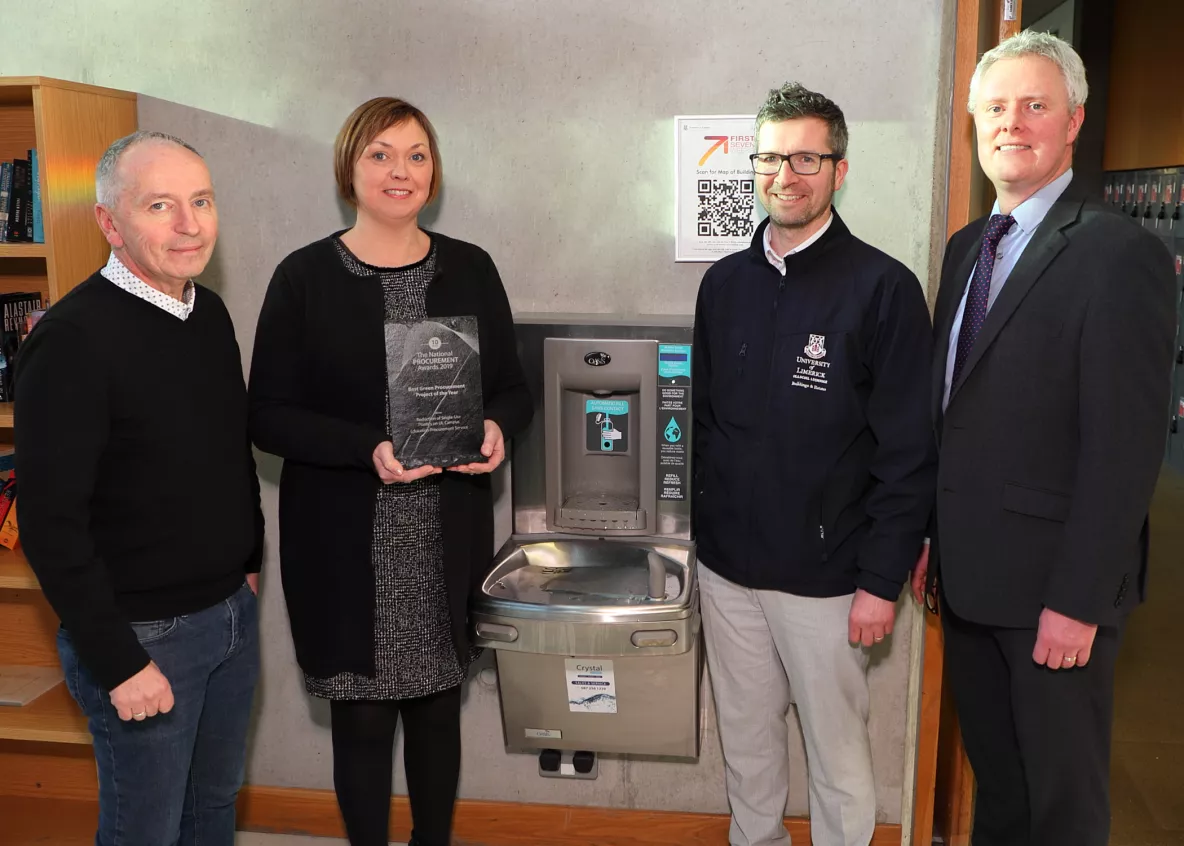
A plan to dramatically reduce single-use plastic waste from the University of Limerick campus could take seven million water bottles out of circulation every year.
As part of its drive to maintain its position as a leader in environmentally-friendly university management and gain the Foundation for Environmental Education’s internationally recognised Green Campus accreditation, UL has embarked upon an exciting project to cut down on single-use plastics.
The project involves the deployment of strategically placed water-filling stations at student-friendly locations across campus to provide a convenient and free alternative to the purchase of single-use plastic water bottles.
The stations, which are fitted with a counter to record the number of units that are dispensed, utilise mains water that is chilled and filtered before being dispensed. To date, 15 water bottle filling stations have already been installed.
The four initial water-filling stations situated in the Glucksman Library have dispensed 550,000 (330ml) refills over the last 12 months, thus avoiding the generation of a significant quantity of single-use plastic waste from just one location on UL’s stunning 367-acre riverside campus.
Based on this usage the four stations should provide savings of approximately 2,750,000 bottle refills over a five-year period. It is estimated that, by the end of year three (2019 – 2021), once the intended target of 43 water bottle stations are installed and commissioned, the generation of approximately 7 million water bottles will be avoided each year.
The original idea to install water bottle filling stations came from the UL Environmental Society, who presented their idea to the Green Campus Committee. Funding was made available via the HEA Educational Sustainable Development Fund and UL’s Buildings and Estates Department teamed up with the Education Procurement Service (EPS), UL Procurement and UL Student Life to complete the project.
Speaking about the initiative Dr Chris Fogarty, UL’s Energy Manager, said: “Working with the EPS to ensure the appropriate specifications were included as part of the procurement has facilitated the ongoing effectiveness of the project to be quantified. Specifically, the inclusion of a bottle counter as a mandatory requirement facilitates users in tracking their contribution to the reduction of single-use plastics on campus, and can be used to help bring about behaviour change.”
EPS estimate that in the first year alone, usage of water filling stations in a single building has had the effect of taking 13 freight containers of plastic-bottled water out of circulation.
As the filling stations are connected directly to mains supply, it also eliminates the need for water supply companies to drive through campus to replenish bottle-fed water coolers, which reduces cost and traffic through the campus.
The significant reduction in water bottle consumption also contributes to a reduction in recycling waste, which needs to be managed on campus weekly. This saving will increase as the water-filling stations are further installed.
The procurement-element of the project was a collaborative effort between UL’s Buildings and Estates and the EPS. The initiative has seen the EPS and UL awarded ‘Best Green Procurement Project of the Year’ at the National Procurement Awards in late 2019.
“Despite a small budget, the effective removal of over 550,000 branded drinking water bottles from circulation on the UL campus in a single year demonstrates the positive environmental impact that a sustainable initiative can deliver,” said UL President Dr Des Fitzgerald.
“It also shows that when a tender process is completed with a clear specification, an engaged project team and proactive rollout to a dedicated stakeholder group, it can have a very significant outcome,” he added.